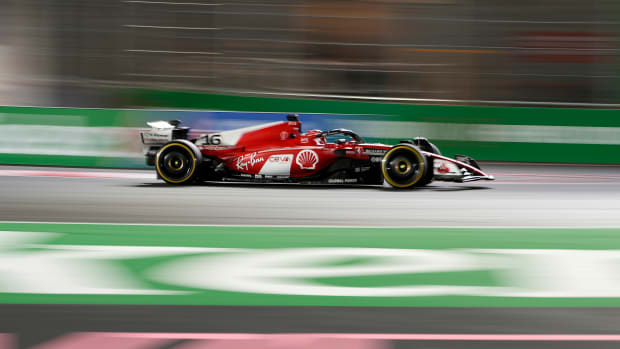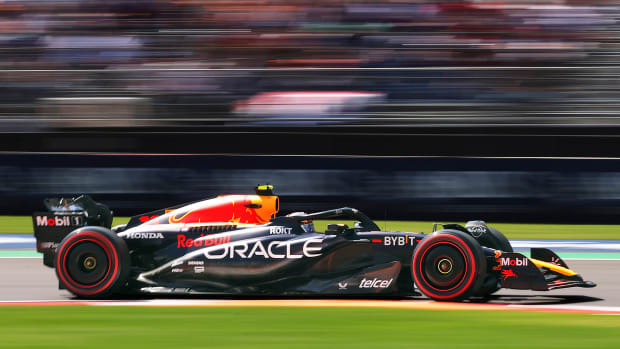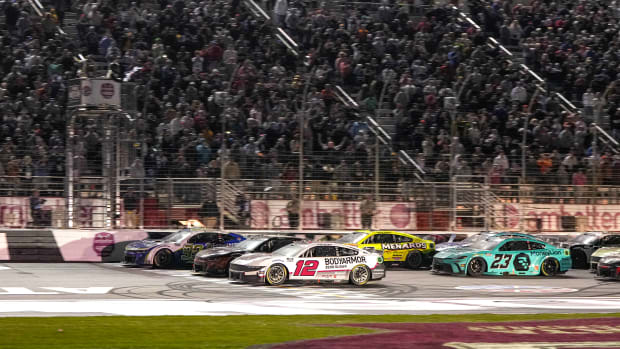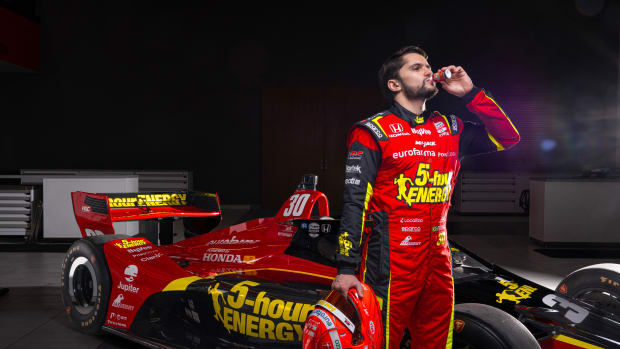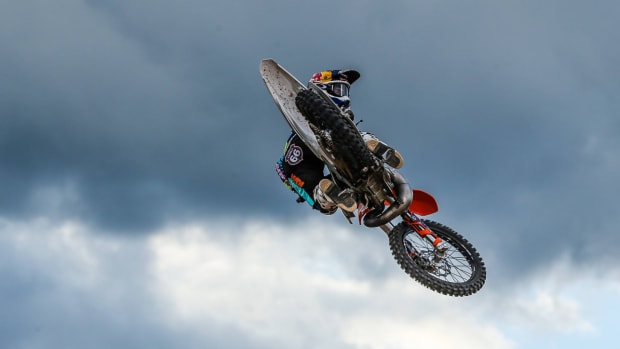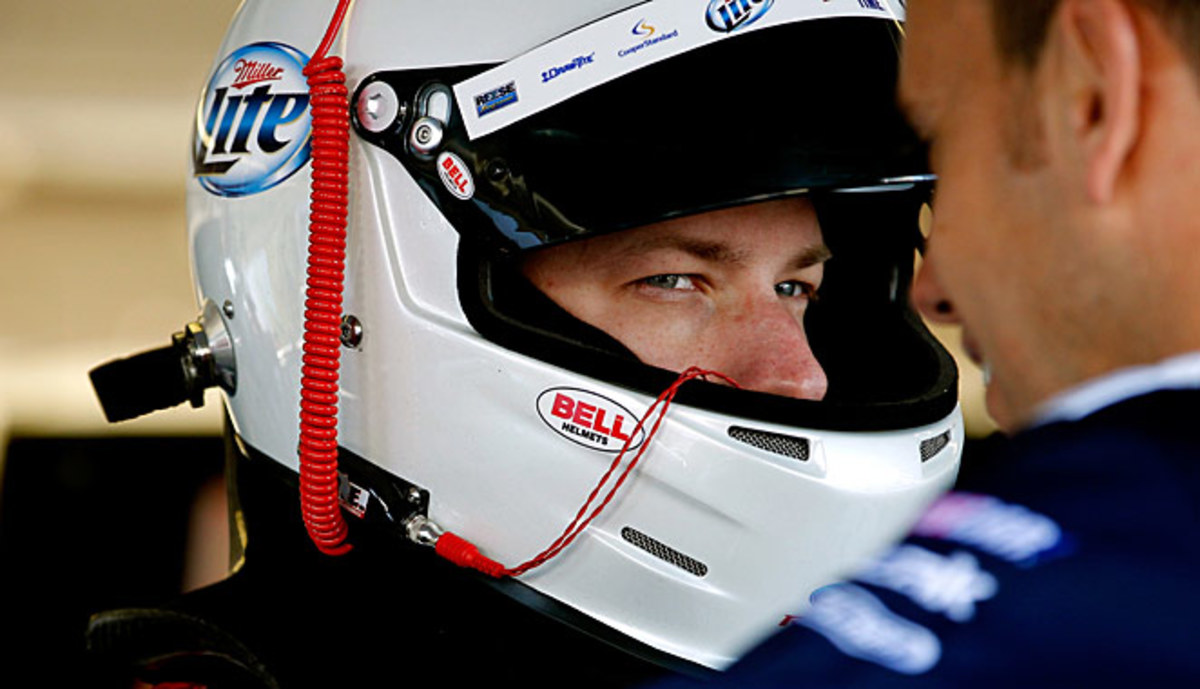
Will NASCAR take the edge off Brad Keselowski?

Brad Keselowski's competitive fire colors his comments as well as how he views his sport.
Jeff Zelevansky//Nascar via Getty Images
How much longer will we see Brad Keselowski remain unafraid to speak his mind and challenge NASCAR's powers that be? The answer seems easy -- for as long as he keeps racing -- but it's never that simple.
As the defending NASCAR Sprint Cup champion, Keselowski's words and ideas carry significant weight. But now that everyone is watching, it won't be enough that he simply answers questions. People will expect him to speak robustly and help solve problems or right wrongs. But Keselowski has been fined by NASCAR and was recently called in to meet with Chairman Brian France, in part, for making critical comments about the sport.
"First and foremost, if I have to be the bad guy in this garage or in this sport so that the series and American motorsports can move forward, it doesn't bother me one bit,'' said Keselowski, who has opened the season with a pair of fourth-place finishes. "I would rather be maybe a less popular champion of a series that is very, very successful than a popular champion of a series that's not.''
Those are encouraging words for fans who yearn for a driver from yesteryear, the kind that took no gruff and told you what he thought without putting it through a PR spin cycle. Keselowski's attitude is to be admired, but it's still early in his reign as defending champion and his career. At age 29, he should have another 15 or so years of competing before he moves to the announcer's booth. With experience, he'll gain more wisdom. Will it make him less vocal or just better at choosing when and how he wants to speak about something?
Tony Stewart once tried this role, but soon backed down, not wanting to deal with the ramifications of his words or actions in the ensuing days and weeks. Now, when Stewart speaks up, it's with purpose, but most of his work is done behind the scenes. It also took Jimmie Johnson a few years as champion to become comfortable speaking up about various issues in the sport. He's learned how to make his point without being shocking. Keselowski, though, is more blunt. But maybe he is the type of leader the sport needs. Maybe it's time for France to be pushed by a someone with a competitive spirit who wants to help make the sport better.
Keselowski's comments in a USA Today story last month earned him separate meetings with France and sister, Lesa France Kennedy, the CEO of International Speedway Corp. In a way it was fitting. The first time Keselowski had much of a conversation with Brian France was in the NASCAR hauler at Phoenix in Nov. 2009 after an ongoing feud with Denny Hamlin resulted in yet another incident in the Nationwide Series. After that meeting, Keselowski explained himself and his climb to NASCAR. "Being aggressive is what got me here,'' he said that day. "Nobody has handed me anything in my career. I've dug and clawed for everything I've got.''
Keselowski's attitude colors how he views racing. He doesn't question issues because he wants to be a contrarian, but because he's striving to make the sport better. He asks what he demands of himself. That attitude is what led him to say in that USA Today story that there needs to be a closer working relationship between NASCAR, teams and sponsors.
"When Bill France Jr. was in charge of NASCAR, he had control of all these pieces and wasn't at the mercy of the TV world,'' Keselowski told USA Today. "He had control of the tracks and NASCAR, which is now divided in two with Lesa and Brian. France Jr. had relationships with the sponsors, drivers and teams. Now we don't have that. Those three other pieces are segregated. Those three pieces need to get together. And until all three of those can unite, we're a house divided, and we're making bad decisions that are affecting how to generate revenue for the sport.
"In today's sports world, you have to be very powerful in drawing people to TV, and we're not TV-friendly. That's one of the key areas for success. Part of that is we're not delivering a product. And we're fighting the tracks. We have to be up on the wheel a little more and looking for what's in front of us, and when we see it, we have to be able to react on it. And in order to be able to react on it, we need to be united.''
Keselowski admitted last week that what he said "was definitely on the edge. I'm not going to run from that. I'm also not going to run away from the validity of some of the things I said.''
Although Fox's ratings for last month's Daytona 500 were the highest since 2008, according to national figures released by Nielsen Media Research, Keselowski's push for unity carries over from his speech at NASCAR's banquet in December.
There, in a raspy-voice, he said, "I hope that as a sport we can continue to find common ground, to unify. ... I hope that every one of us can continue to work together and find that common ground, and, as a champion, I want to be your leader and I want to help you make it happen.''
Once known by some fans primarily for tweeting a picture of the jet dryer fire during last year's Daytona 500, Keselowski's success on the track and outspokenness off of it show that there's more to him than people expected.
"Keselowski has impressed me,'' Jeff Gordon said this past weekend at Phoenix. "He's not a guy that I think a lot of people had on their radar as being able to come into the sport and take an organization (Penske) that had never won a championship and get them to a championship. It is talent, but it's also just being willing to work just as hard as you can and do whatever it takes and he's got that great work ethic.''
Those words came from a driver who faced Keselowski's scorn last November when the series was at Phoenix and Keselowski unleashed a profanity-laced commentary about Gordon intentionally wrecking Clint Bowyer in retaliation for previous incidents. While he's since tamed his language, Keselowski's feelings remain unchanged. "I think that kind of stuff, intentionally wrecking, is extremely harmful to the sport,'' he said before this season. "It jeopardizes the credibility of all us.''
Beyond the checkered flags and oversized checks, isn't that what it is all about? Credibility. Keselowski has it. Now it's a matter of using it wisely.
POWER RANKINGS
1. Jimmie Johnson -- Points leader starts the season with a Daytona 500 win and a runner-up finish at Phoenix. Enough said.
2. Dale Earnhardt Jr. -- Opens a season with a pair of top-five finishes for the first time since 2004, when he won a career-high six races.
3. Brad Keselowski -- With two fourth-place finishes, he's placed in the top 10 in 19 of the last 22 races, dating back to last season.
4. Denny Hamlin -- Went from starting at the back (because of an engine change) to racing at the the front, finishing third at Phoenix.
5. Carl Edwards -- Snaps his 70-race winless drought with a victory at Phoenix and makes amends for his disappointing Daytona Speedweeks.
6. Clint Bowyer -- Not showing any signs of the curse of finishing second in the points last year. He's scored 25 more points in the first two races of this season than he did in the first two of 2012.
7. Matt Kenseth -- He's been strong early, his Daytona 500 engine woes notwithstanding. Keep an eye on him.
8. Tony Stewart -- Finished eighth at Phoenix to recoup some of the ground he lost after being caught in a Daytona 500 wreck.
9. Jeff Gordon -- Finished ninth at Phoenix, marking the fourth consecutive year that he's placed in the top 10 in the spring race there.
10. Mark Martin -- Things didn't go well late at Phoenix, but he did win the pole after finishing third in the Daytona 500. Not too bad.
